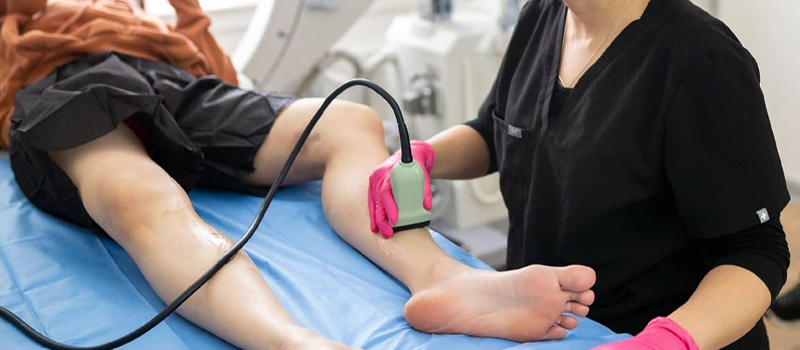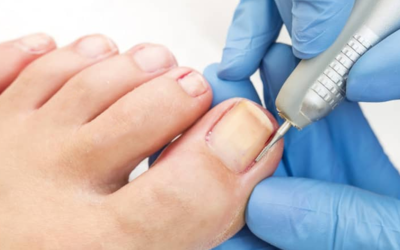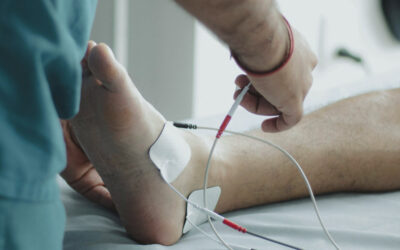Peripheral Artery Disease (P.A.D.) is often referred to as a “silent” condition, creeping up on individuals without noticeable symptoms until it reaches an advanced stage. This dangerous condition, caused by the narrowing or blockage of arteries in the legs, can severely impact circulation, leading to serious complications such as heart attacks, strokes, and even limb amputations. Unfortunately, many people with P.A.D. are unaware they have it until it’s too late.

At Capital Foot Care, we emphasize the importance of regular screenings for P.A.D. to catch the condition early and improve patient outcomes. Dr. Muhammad A. Khalid, Dr. Fritz-Andre Duterlein, and Dr. Herman Zarate are dedicated to helping you maintain your vascular health and take proactive steps to prevent severe complications.
Understanding Peripheral Artery Disease (P.A.D.)
Peripheral Artery Disease occurs when plaque builds up in the arteries, restricting blood flow to the extremities, particularly the legs and feet. This condition is most common in individuals over 50, especially those with risk factors like diabetes, high cholesterol, hypertension, or a history of smoking. People with P.A.D. often experience symptoms such as leg pain while walking (claudication), coldness in the lower legs, or non-healing wounds. However, many people with P.A.D. may not experience symptoms at all, making regular screenings crucial.

Why Regular Screenings for P.A.D. Are Crucial
Regular screenings for P.A.D. play a key role in early detection and management, preventing more serious health issues down the road. Here’s why routine screenings are essential:
- Early Detection Saves Lives: P.A.D. is a progressive disease that can lead to life-threatening conditions, including heart attacks and strokes. Catching the disease early through routine screenings can prevent these complications, allowing for timely intervention and treatment.
- Prevention of Severe Complications: Left untreated, P.A.D. can lead to critical limb ischemia, where blood flow is so restricted that it can result in chronic ulcers, infections, and even amputations. Regular screenings can help identify at-risk patients before these complications develop.
- Effective Treatment: Early detection allows for more effective treatment options. Medications, lifestyle changes, and interventions such as angioplasty or stenting can restore proper blood flow, improving quality of life and reducing pain.
- Monitoring Progress: For individuals already diagnosed with P.A.D., regular screenings can monitor the progression of the disease and ensure that treatment plans are working effectively. It also allows for adjustments in treatment as needed.

Risk Factors for P.A.D.
Certain individuals are more at risk of developing P.A.D. than others. If you fall into any of the categories below, regular screenings are even more critical:
- Age 50 or older
- Smoking history
- Diabetes
- High blood pressure
- High cholesterol
- Family history of cardiovascular disease
- Sedentary lifestyle

If you have any of these risk factors, we encourage you to schedule a screening at Capital Foot Care to evaluate your vascular health.
What to Expect During a P.A.D. Screening
At Capital Foot Care, our expert podiatrists offer comprehensive P.A.D. screenings using advanced diagnostic tools. During a screening, you can expect the following:
- Physical Exam: The doctor will check your feet and legs for any signs of poor circulation, such as weak pulses or skin changes.
- Ankle-Brachial Index (ABI): This simple, non-invasive test compares the blood pressure in your ankle to that in your arm. A lower pressure in your ankle may indicate blocked or narrowed arteries.
- Ultrasound: In some cases, an ultrasound may be used to visualize blood flow in the arteries and identify any blockages.
- Blood Tests: Blood tests may be conducted to check cholesterol levels, blood sugar levels, and other factors that contribute to P.A.D.

Why Choose Capital Foot Care?
At Capital Foot Care, we are committed to providing top-tier care to help you stay ahead of P.A.D. and other foot and vascular health issues. Our highly trained podiatrists, Dr. Muhammad A. Khalid, Dr. Fritz-Andre Duterlein, and Dr. Herman Zarate, specialize in the prevention, diagnosis, and management of P.A.D. We offer personalized care plans to address your specific needs and ensure the best outcomes for your vascular health.

Locations for Capital Foot Care
We are proud to serve patients across several convenient locations:
- Riverdale, MD: 6510 Kenilworth Ave. Suite 2300
- Takoma Park, MD: 7610 Carroll Ave. Suite 380
- Largo, MD: 8816 Jericho City Drive
- Washington, D.C.: 2041 Martin Luther King Jr Ave SE, Suite 103
- Washington, D.C.: 1328 Southern Ave SE, Suite 209
For more information or to schedule a P.A.D. screening, call us at 301-927-FOOT (3668) or email us at [email protected]. Don’t wait until symptoms arise—take proactive steps to protect your vascular health today.
Regular screenings for Peripheral Artery Disease (P.A.D.) are essential for early detection, effective management, and prevention of severe complications. At Capital Foot Care, our experienced podiatrists are here to help you safeguard your health through comprehensive screenings and personalized care. Contact us today to schedule your screening and take control of your vascular health.










